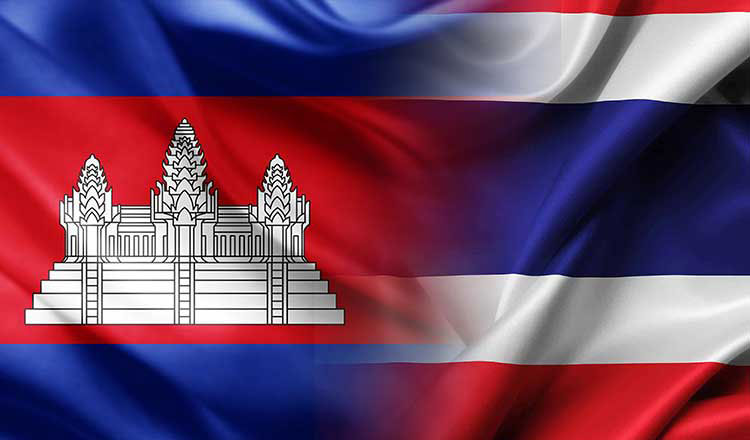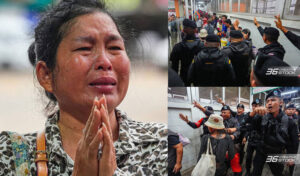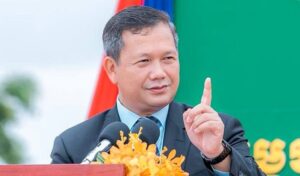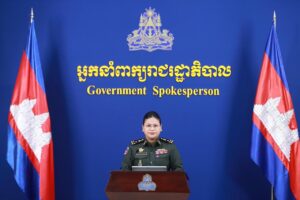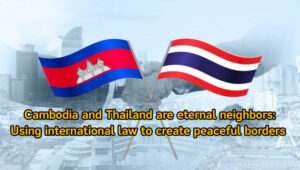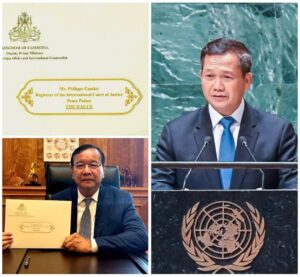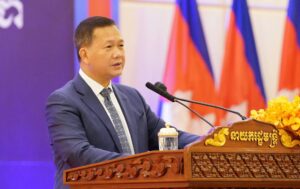Behind the Smiles: Thai Government’s Statement on Cambodia Border Masks a Different Reality
On the surface, the recent statement by Thailand’s Border Command Centre (Sor Bor Tor Kor), as reported by Khaosod English, on the evening of 24 June 2025, presents an image of calm professionalism and neighborly goodwill. According to Thai authorities, all border crossings remain open, there is no intention to cut electricity or oil supplies to Cambodia, and they do not want to burden the people of either country with inter-state disputes.
But beneath this polished press release lies a troubling pattern of contradictions, deception, and quiet escalation. The Thai government’s public messaging does not match its actions on the ground—and the Cambodian people are not so easily fooled.
A Pattern of Mixed Signals
Let us be clear: the Thai government’s narrative is riddled with contradictions. On one hand, officials claim they seek peace and stability. On the other hand, just days earlier, the Thai Prime Minister publicly threatened to suspend exports of electricity, oil, and goods to Cambodia under the vague pretext of combating “transnational crime.”
Is it not suspicious that mere hours after this threat, the Thai government suddenly pivoted to a message of “non-escalation” and “humanitarian concern”? If this isn’t state-level intimidation masked as diplomacy, what is?
In fact, since June 12, 2025, it was Cambodia that took the principled step of halting electricity and internet imports from Thailand—asserting its sovereignty and preparing for energy independence. Cambodian authorities also ordered a ban on Thai movies on TV and cinema screens, a clear signal of national dignity in the face of Thailand’s provocations.
Medical Aid and Humanitarian Access: A PR Stunt?
The article boasts of Thai hospitals admitting Cambodian patients in recent days—as if this is some extraordinary act of charity. In reality, cross-border medical care is routine, facilitated through paid services and bilateral agreements.
To parade such acts as political favors is self-serving and dishonest. More importantly, it distracts from the underlying aggression in Thailand’s recent rhetoric and policy. The real question remains: Will this access be quietly revoked when political pressure increases?
Internet and Oil Access: Who Is Really Pulling the Plug?
The Thai side claims there is no intention to block internet or fuel exports to Cambodia. But actions speak louder than press briefings. Cambodian provinces bordering Thailand have already reported internet disruptions, delays in oil deliveries, and increased inspection protocols. These are not mere coincidences—they are pressure tactics.
Ironically, it was Cambodia—not Thailand—that chose to stop oil imports from Thai suppliers. When your neighbor makes threats one day and denies them the next, any responsible government would move to diversify its sources and protect national interests.
Playing the Victim While Fanning the Flames
Thai officials have urged their citizens not to post “extremist views” online, while simultaneously depicting Cambodian netizens as unruly and hostile. This is a classic tactic: play the victim while stoking nationalist sentiment at home.
Let us not pretend the hostility is one-sided. In recent months, Thai media and political figures have led a campaign of smear and defamation against Cambodia—accusing us of being a “crime hub,” misrepresenting our economic statistics, and blaming us for issues that originate within Thailand itself.
Now, when Cambodians speak up and defend their nation, Thai authorities call for “restraint.” The hypocrisy is plain for all to see.
A Two-Faced Diplomacy
The Thai government’s so-called professionalism is little more than well-rehearsed duplicity. One face is shown to the media and international community—cooperative, calm, measured. The other is directed inward—escalating tensions, issuing threats, and whipping up anti-Cambodian sentiment to distract from domestic failings.
Let us be frank: this is not diplomacy—it is power politics disguised in polite language. When caught red-handed, the Thai government rushes to rewrite the narrative. But the Cambodian people are watching—and we will not forget.
Words Are Cheap, Actions Matter!
Cambodia welcomes peaceful, constructive dialogue with our neighbors. But for any dialogue to be meaningful, it must be grounded in truth, mutual respect, and consistency. Empty reassurances and veiled threats cannot be passed off as statesmanship.
The Thai government must stop playing both sides—smiling to the cameras while tightening the screws behind closed doors. Only when honesty replaces hypocrisy can trust be restored, and Southeast Asia can move forward in unity and peace.
By Roth Santepheap, Geopolitical Analyst based in Phnom Penh, Cambodia. The views and opinions expressed are his own.


